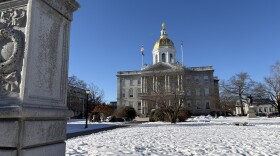-
Gov. Kelly Ayotte announced Tuesday that she would nominate Christopher Ellms Jr., the current deputy commissioner of the New Hampshire Department of Energy, for the role of chairman of the Public Utilities Commission, a court-like entity that regulates utilities in the state.
-
A 145-mile transmission line bringing electricity from Canada into the New England grid through Maine began commercial operations Friday. It’s an alternative to the Northern Pass, the failed proposal to run power lines through northern New Hampshire.
-
Hay planes de poner una nueva instalación de ICE, en Merrimack, según documentos obtenidos por el Washington Post. Pero la ciudad dijo que aún estos planes no salen a la luz.
-
Merrimack Station has been winding down its operations for years. But in September, they announced they would cease operations of their coal-fired generators.
-
According to a list shared with NHPR, more than 200 projects lost funding nationwide.
-
The Public Utilities Commission granted requests from a consumer advocacy group and state agencies to rehear the issue.
-
The Office of the Consumer Advocate, the New Hampshire Department of Energy and the state’s AARP chapter filed separate rehearing motions to the Public Utilities Commission. Gov. Kelly Ayotte says she supports a rehearing of the case.
-
The new law, signed by Gov. Ayotte earlier in August, guts state resources targeted at exploring and boosting offshore wind in New Hampshire.
-
The law, which allows for off-grid energy providers, might protect consumers from higher energy rates while still encouraging these power-hungry businesses to set up in the state.
-
It’s unclear how the Constitution Pipeline, which is set to run from Pennsylvania to New York, would affect New England’s access to gas.

Play Live Radio
Next Up:
0:00
0:00
Available On Air Stations









